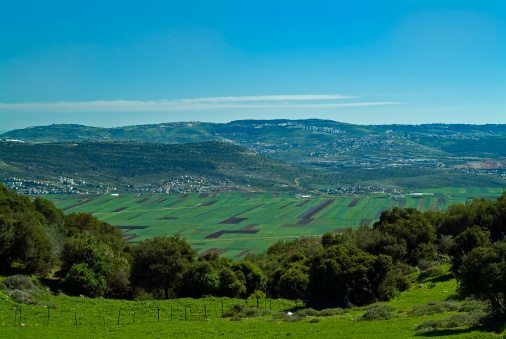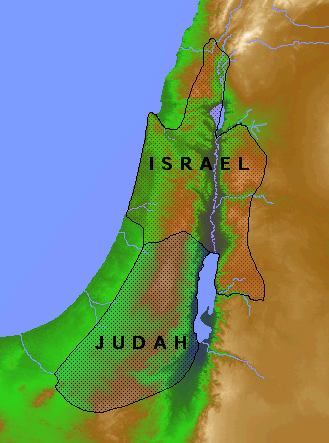In order to see all images displayed correctly, click here.
42 They said, “Is not this Jesus, the son of Joseph, whose father and mother we know? How does he now say, ‘I have come down from heaven’?” 43 Jesus answered them, “Do not grumble among yourselves.
 The Hoi Ioudaioi who followed Jesus to Capernaum were from Nazareth, the village where Jesus’ family resided after returning from Egypt. The Hoi Ioudaioi asked how was it possible that Jesus came down from heaven, since they knew his parents from Nazareth’s village life. At first, this seems like an honest question with no hidden agendas. However, as we continue to read, we see Jesus (who sees the hearts of men), accuse them of grumbling among themselves. It is important that we note the literary connection with the Israelite grumbling in the desert. The Israelites complained even when God was providing them with manna from heaven! Earlier in this chapter, the Hoi Ioudaioi were proudly saying that Moses gave them manna from heaven. Jesus said that he was not manna, but bread, which was much better, and he was coming down from heaven. Yet we see them grumbling in the same way as Israel had complained in the desert. As the passage continues, in vs. 49, Jesus confirms this same point by referring to those who ate the manna in the wilderness and still died, as “your” (Hoi Iudaioi)’s fathers. By implication these were the fathers of all those who do not believe.
The Hoi Ioudaioi who followed Jesus to Capernaum were from Nazareth, the village where Jesus’ family resided after returning from Egypt. The Hoi Ioudaioi asked how was it possible that Jesus came down from heaven, since they knew his parents from Nazareth’s village life. At first, this seems like an honest question with no hidden agendas. However, as we continue to read, we see Jesus (who sees the hearts of men), accuse them of grumbling among themselves. It is important that we note the literary connection with the Israelite grumbling in the desert. The Israelites complained even when God was providing them with manna from heaven! Earlier in this chapter, the Hoi Ioudaioi were proudly saying that Moses gave them manna from heaven. Jesus said that he was not manna, but bread, which was much better, and he was coming down from heaven. Yet we see them grumbling in the same way as Israel had complained in the desert. As the passage continues, in vs. 49, Jesus confirms this same point by referring to those who ate the manna in the wilderness and still died, as “your” (Hoi Iudaioi)’s fathers. By implication these were the fathers of all those who do not believe.
44 No one can come to me unless the Father who sent me draws him. And I will raise him up on the last day.
 In the previous section I argued that that passage must be read as referring to national salvation and not simply to the individualistic salvific experience as usually affirmed. Here I want to mention an important point. Reading it in a national sense does not preclude individual application. The nation of Israel is in fact made up of tribes, families, and individuals. Although the story must be understood in the national context, it must also include the individual faith of every Israelite.
In the previous section I argued that that passage must be read as referring to national salvation and not simply to the individualistic salvific experience as usually affirmed. Here I want to mention an important point. Reading it in a national sense does not preclude individual application. The nation of Israel is in fact made up of tribes, families, and individuals. Although the story must be understood in the national context, it must also include the individual faith of every Israelite.
Jesus clearly says that it is not possible for anyone (particularly for those included in this context) to follow him, unless the father personally draws them to Jesus. Given the context, these words apply to the members of the hoi Ioudaioi. This is a truly humbling verse. No person in the world (even Jesus’ own world) can follow Jesus in true faith by his own volition and power. It was Israel’s God’s gracious activity that worked in the hearts of people.
45 It is written in the Prophets, ‘And they will all be taught by God.’ Everyone who has heard and learned from the Father comes to me— 46 not that anyone has seen the Father except he who is from God; he has seen the Father. 47 Truly, truly, I say to you, whoever believes has eternal life. 48 I am the bread of life.
 At this point, Jesus makes reference to Jer. 31.31-33: “Behold, the days are coming, declares the Lord, when I will make a new covenant with the house of Israel and the house of Judah, not like the covenant that I made with their fathers on the day when I took them by the hand to bring them out of the land of Egypt, my covenant that they broke, though I was their husband, declares the Lord. For this is the covenant that I will make with the house of Israel after those days, declares the Lord: I will put my law within them, and I will write it on their hearts. And I will be their God, and they shall be my people. And no longer shall each one teach his neighbor and each his brother, saying, ‘Know the Lord,’ for they shall all know me, from the least of them to the greatest, declares the Lord. For I will forgive their iniquity, and I will remember their sin no more.”
At this point, Jesus makes reference to Jer. 31.31-33: “Behold, the days are coming, declares the Lord, when I will make a new covenant with the house of Israel and the house of Judah, not like the covenant that I made with their fathers on the day when I took them by the hand to bring them out of the land of Egypt, my covenant that they broke, though I was their husband, declares the Lord. For this is the covenant that I will make with the house of Israel after those days, declares the Lord: I will put my law within them, and I will write it on their hearts. And I will be their God, and they shall be my people. And no longer shall each one teach his neighbor and each his brother, saying, ‘Know the Lord,’ for they shall all know me, from the least of them to the greatest, declares the Lord. For I will forgive their iniquity, and I will remember their sin no more.”
This significant, in and of itself. When these words of Jeremiah were brought up by Jesus, everyone knew that they referred to the restoration promise of Israel’s God one day to unify the separated kingdoms of Judah and Israel. As they, both Israel and Judah, feed on the true bread of heaven – Jesus, they are being to taught to do so by Israel’s God himself.
This reference of Jesus to Jeremiah’s New Covenant text is an important witness that supports what I’m suggesting – that Jesus believed he had come to restore both houses of Israel (Judah and Israel). Israelite Samaritans, who lived in Samaria, the home of the ten Northern tribes of Israel, would certainly be part of this amazing eschatological restoration of Israel. If this is kept in mind as we read the rest of John’s Gospel, then the Samaritan themes, especially John 4 (Samaritan woman encounter), would become much clearer.
49 Your fathers ate the manna in the wilderness, and they died. 50 This is the bread that comes down from heaven, so that one may eat of it and not die.
 As I mentioned above (vs.42-43), Jesus makes a sharp distinction between the unbelieving hoi Ioudaioi and other Israelites. He says that the entire generation that came out of Egypt were “their” fathers, the ones who ate manna in the wilderness and did not enter the Land of the Promise. In this, he exposes the hypocrisy of his challengers who dared refer to Moses’ and God’s gracious provision of manna in the wilderness. Jesus skillfully and prophetically challenges their unbelief with their own argument. As we look at this, we need to see Jesus’ polemic against hoi Ioudaioi is an inner Israelite, inner Jewish polemic.
As I mentioned above (vs.42-43), Jesus makes a sharp distinction between the unbelieving hoi Ioudaioi and other Israelites. He says that the entire generation that came out of Egypt were “their” fathers, the ones who ate manna in the wilderness and did not enter the Land of the Promise. In this, he exposes the hypocrisy of his challengers who dared refer to Moses’ and God’s gracious provision of manna in the wilderness. Jesus skillfully and prophetically challenges their unbelief with their own argument. As we look at this, we need to see Jesus’ polemic against hoi Ioudaioi is an inner Israelite, inner Jewish polemic.
51 I am the living bread that came down from heaven. If anyone eats of this bread, he will live forever. And the bread that I will give for the life of the world is my flesh.”
Jesus said to the Samaritan woman “Everyone who drinks of this water will be thirsty again, but whoever drinks of the water that I will give him will never be thirsty again. The water that I will give him will become in him a spring of water welling up to eternal life.” (John 4.13-14) Now he says virtually the same thing to the hoi Ioudaioi. This very theme was present in the earlier chapters of John in which the Israelite Samaritans believed by only hearing Jesus words and the hoi Iudaioi did not believe in spite of seeing the Jesus’ miracles. They were just like the generation of Israelites in the wilderness. The Gospel, therefore, invites both Samaritans and Jerusalem-centered Israelites, and whoever else might be listening in, not to repeat the spiritual mistakes of their fathers in the wilderness, choosing the new and living way instead.
To sign up for weekly posts by Dr. Eli, please, click here. It is recommend by Dr. Eli that you read everything from the beginning in his study of John. You can do so by clicking here – “Samaritan-Jewish Commentary”.
© By Eli Lizorkin-Eyzenberg, Ph.D.
To receive more information about learning Biblical Languages with Hebrew University of Jerusalem/eTeacher Biblical program online at affordable cost, please, click here.





Jesus said to him: You say you are childrens of Abraham, but I rose an stone and I can get many childrens of Abraham; you are childrens of your father the devil! I think that He was some angry in that moment, exhausted by their stone hard hearts.